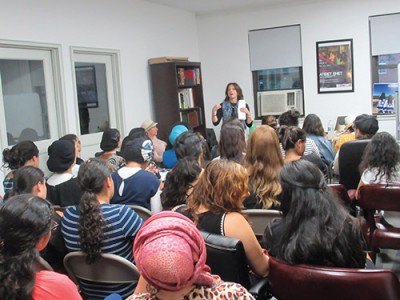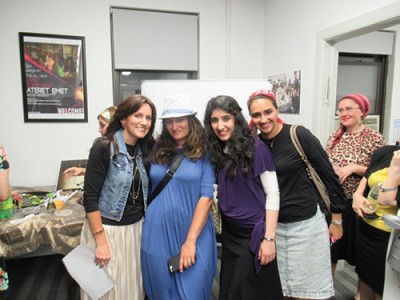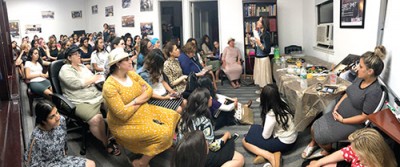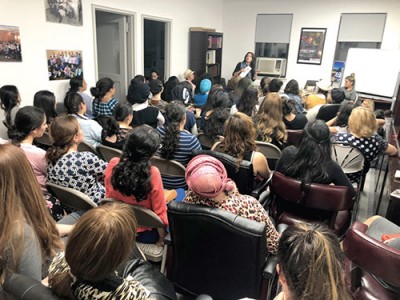



“Marriage takes a lot of work. It’s important to have the proper expectations for marriage. You can’t expect it will be all birds singing and rainbows. You have to be prepared for the bumps,” Rebbetzin Devorah Kigel stated. On Monday evening, July 16, an overflow crowd of women filled the Emet Outreach office on Union Turnpike eager to hear a shalom bayis shiur from Rebbetzin Kigel. “She’s an amazing rebbetzin,” one Emet Outreach student exclaimed. It was clear she has a beautiful connection with so many women of all ages and levels of observance.
What an incredible impact Emet Outreach is making on our Queens community and beyond, with their college and community programs and rabbis and educators who stay in touch with students and are truly making a difference in their lives.
We all know that shalom bayis and its impact on the Jewish family, is the key to Jewish existence. Bilaam knew this when he wanted to curse the Jewish people and ended up blessing us because of the beauty and modesty of our tents in the famous prayer Mah Tovu. Later, this was what he attacked when he wanted to hurt the Jewish people with the incident of Baal P’or.
With warmth, humor, and genuine caring, Rebbetzin Kigel shared a focused shiur that covered the ten things I wish I knew about marriage before I married. The practical ideas she taught were received with great interest by her large audience of married women and single women preparing to marry. “Shanah rishonah is not one year,” she stated. “It’s really ten years. It takes a decade to figure your spouse out and get in a good place with your marriage.” She added a caveat: “This all applies to regular, normal marriages. Anything off the chart like physical abuse, emotional abuse, mental illness – these rules do not apply.”
She quipped, “Men are a different species.” Wisely she noted that you cannot expect them to be like your best girlfriend. “I do feel my husband is my best friend but not like a girlfriend.” She explained that most women need to be validated and men don’t always know how to do this. She then began listing the ten things that we should know to help us with shalom bayis.
First, marriage is not a constant state of bliss. You need proper expectations. Marriage helps us work on our midos. We are here in this world to work on our character traits. Hashem gives us people to help us do this. She said, “No one escapes.” People in our society are brainwashed with the idea that once we make the right choice in marriage then we merrily sail off into the sunset. This is a lie. It’s going to be hard work. She said, “You want to find someone you have fun with doing regular mundane things.” She shared the analogy of the hermit crab that grows out of its shell when it becomes uncomfortable and in pain, and then it has a new shell. The discomfort and pain contribute to his growth. She taught, “Change and growth only come through struggle.”
The second point is you should take a last hurrah vacation before children come on the scene. Spend as much time together as possible. This is one of the halachos of the first year of marriage. “Have a lot of date nights before the kids to build your marriage.” She spoke about a savings account that needs deposits before you can make withdrawals. Withdrawals are criticisms. Put in lots of deposits of compliments and “I love you’s” before any criticisms or suggestions. She explained that therefore engagement and the first year are so challenging because you haven’t had time to put in deposits. When you want to criticize, always ask yourself,” Is it worth risking my shalom bayis to have this discussion?”
The third idea is to maximize each phase of marriage. Train yourself so chesed is natural. Rebbetzin Kigel taught, “Marriage is about putting someone else’s needs first much of the time.” She noted that the biggest problem she hears over and over is women who feel stretched too thin. They are working outside the home and responsible for the children and the house and they don’t have time for themselves or their marriage. She advised, “Think about how much time you spend out of the house when you have young children.” She shared how she adapted her work schedule, so she could be home more when her children were little. When you are married with children, it is giving 24/7. This is the chesed you are involved in.
Please don’t keep score, she cautioned. Don’t count how much you did and how much your spouse did. She also stated, “Once you are under the chupah, you have to say, this person is the bashert for me.”
The fourth idea is that your husband cannot be expected to read your mind. Let him know what you want and need. “Don’t think he doesn’t love you if he can’t intuit what is in your head.” She stated, “We are more complicated than men.”
The fifth idea is marriage is not like a trip to Costco. There is a mentality today if something breaks, we return it and get a new one. Repair doesn’t happen much. This mentality has seeped into our consciousness. If both partners are willing to give 100 percent, then you can work on it. She imparted, “If you are not ready to make marriage the priority, then you are not ready to get married.
The sixth idea is G-d’s presence is there when a husband and wife are intimate according to the laws of Taharas HaMishpachah. There is so much potential for holiness in this area. Just as we need to work on closeness in communication, and other areas in our relationship, this is an area we need to work on as well.
The seventh idea is, while dating, keep your eyes wide open; but under the chupah, close one eye as much as possible. We want to have an ayin tovah. Remind yourself constantly why you married your husband. It’s work to constantly train our vision towards positive.
The eighth idea is that the most important thing in a husband is midos. Jobs and money come and go. Infatuation lasts about eighteen months. She taught, “A loving devoted mentch is everything.” You want to marry someone with a good heart who treats you respectfully She stressed that he must have someone he will listen to for advice, like a rabbi or therapist or even an older married relative. “Do not underestimate the importance of a third party.” She said to the single girls, “Train yourselves to be attracted to the nice guys. A good dresser with swag is not necessarily going to be a good husband.”
The ninth idea is you must allow yourself to depend on someone. “He wants to help me. Rely on him.” You want your husband to feel like a hero, not a child. Treat him as your partner. Always phrase needs as requests, not as demands.
The tenth idea is you want to marry someone with the same vision for the future who shares your Jewish values and goals.
The eleventh idea is that each spouse is working on his or her character development and they will naturally meet in the middle and grow closer to G-d. Judaism isn’t about sacrificing for one another. It’s about constant work on oneself. This work is contagious.
She cautioned, “Men don’t respond well to complaints and criticisms. Be careful. Try not to be critical. Don’t’ be his mother. Don’t focus on the negative.”
She ended with a powerful idea. When you are about to criticize, think United 93. That was the plane that crashed with 9/11 terrorists aboard. Spouses called to say good-bye then, and their messages were “I love you,” not anything else. “We can get bogged down in stupidities in life.” “I want to focus on what is important in my life and my husband. Hashem gave me this gift of a husband with a leiv tov who wants to make me happy. He has different strengths and we complement each other.” She concluded with a beautiful brachah for the married and single members of the audience.
Everyone left uplifted and determined to work on these important ideas.
She mentioned some helpful books, including The 5 Love languages by Gary Chapman and Understanding Men by Alison Armstrong.
By Susie Garber
Rebbetzin Devorah Kigel Draws Record Crowd in Queens
Typography
- Smaller Small Medium Big Bigger
- Default Helvetica Segoe Georgia Times
- Reading Mode


